#AONO20: Straigth Across The Spitfire
April 2024 marks the 19th anniversary of the legendary Spitfire single, which was released digitally and on vinyl on 28th March 2005 and on CD on 11th April. It’s also worth noting that Always Outnumbered, Never Outgunned will celebrate its 20th anniversary in 2024, and to mark the occasion we’ve decided to share some rare details behind each of the album’s tunes and shed some light on the era as a whole. We kick off the #AONO20 series with this entry, starting with an in-depth look at the opening track.
The first track on the album was one of the last to be recorded in early 2004: it was finished at the last minute before release and did not even appear on the promo CDs sent to music journalists at the end of April 2004. New Music Express reported the case in detail.
NME: We can confirm it exists, and we’ve also got Liam Howlett talking all about the band’s first LP in seven years. […] NME.COM were invited to an exclusive showcase of a sample of the album last week in London. Clips of six songs were played, ’Girlz’, ’Get Up Get Off’, ’Wake Up’, ’Ice’, ’1.9.6.5’ and ’Hotride’.
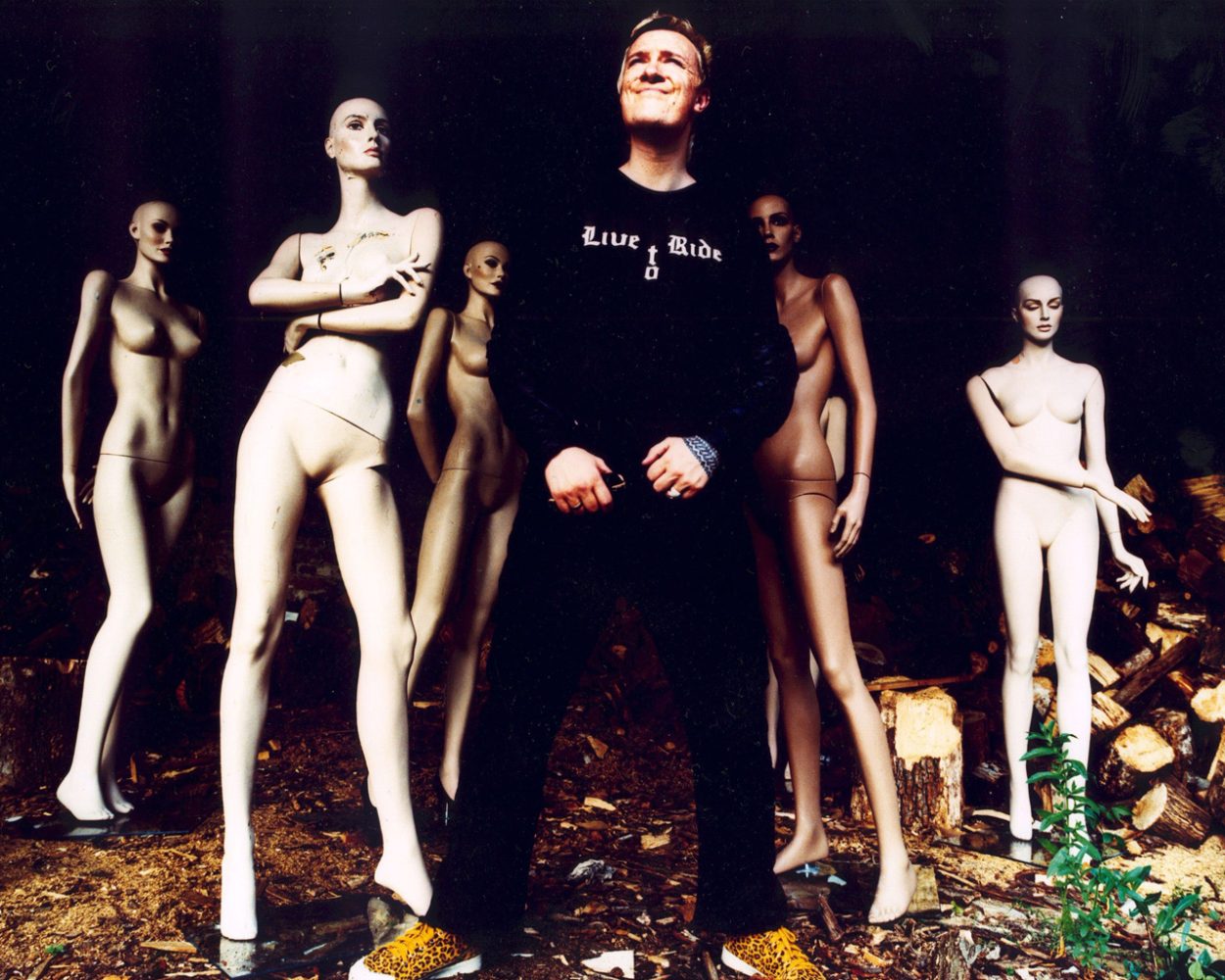
Liam first teased the track to Andrea Schnepf (Neko) on 30th April 2004: Howlett shared the first details of the forthcoming album in his letter to the community, ending the message with the line ‘If I was in World War II, they’d call me Spitfire’. Master H. returned to his roots in many ways on this record: Keith and Maxim were not involved (as Liam said, it’s just ‘the beats and the music’) and the vocals were only used as a minor detail to intensify the atmosphere. Fortunately the record didn’t become a second part of The Fat Of The Land with its verse/chorus approach.
Liam for SoundOnSound: [Lyrics] back the attitude of the song without taking the focus away from the music. Even with a track like ‘Spitfire’, where the lyrics are very much ‘in your face’, there’s still the sense that the music is the main thing.
- SPITFIRE VOCAL (JULIETTE LEWIS)
The lyrics clearly refer to the British WWII fighter aircraft, the Supermarine Spitfire, which was in active service from the late 1930s to the mid-1950s. It was recorded by American actress and singer Juliette Lewis: you may know her from Natural Born Killers or From Dusk Till Dawn, she provides the main vocal sample on the track.
For many years, however, the intro performer was unknown, but a few years ago, Howlett confirmed that this sweet hook belonged to Natalie Appleton of All Saints. ‘I’ll let you into a secret, though… My wife did do the opening vocal on Spitfire. Not many people know that’, Liam told a BBC journalist.
- SPITFIRE VOCAL (NATALIE APPLETON)

Photographer: Dave Hogan / Getty Images
Like much of the album, ‘Spitfire’ was sketched in Howlett’s own bedroom, in an environment of complete tranquillity – it’s been quite a long time since Liam has felt so comfortable and focused at the same time.
Liam for SoundOnSound: I’d get into bed, put Moonraker on my DVD and create this idyllic cocoon of happiness that allowed me to think really clearly. I’d know exactly what I wanted to do. Reason really helped because it’s so quick to get ideas down and that was when I really started writing. I wrote ‘Spitfire’ […] in bed. I’d get the demos and ideas down on Reason — the beats, the programming, the basic layouts and the initial vibe — then I’d go into the studio the next day and play the boys the results.
At the same time, Liam stayed true to his roots and also used a lot of analogue gear. The sound of the album was heavily Korg-filled, something Howlett talked about in detail in an interview with the guys: ‘The microKORG, in particular, features heavily on the album. It’s certainly a bit of gear that has really helped me to write. […] It has this cool noise like a ‘Human League’ noise that came out into the end in ‘Spitfire’.
By the way, while we’re on the subject of this interview for Korg, let’s remember the old story about the ‘supposedly unreleased track’ titled To The End, which appeared because the transcriber didn’t quite understand what Howlett actually meant. Apparently the interview was tape-recorded and then transcribed into text: that’s where the transcriber misinterpreted Liam’s words about how the microKORG synthesiser was used towards the end of the track ‘Spitfire’. As a result, a misquotation went to press that allegedly read as follows: ‘Also, it has this cool noise like a Human League noise that came out on To The End and Spitfire’.
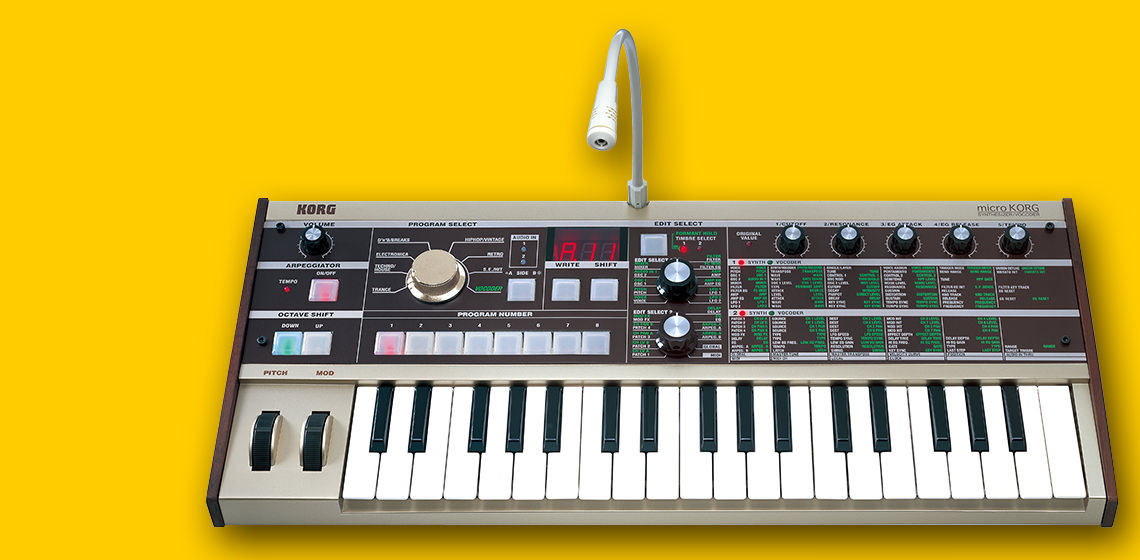
Photo: korg.com
After January 2004, the writing and recording process came to an end and it was time for the final phase: Liam and Neil McLellan (The Prodigy’s sound bloke, responsible for the band’s sound from 1993 to 2015) moved to Whitfield Street Studios for the mixing. Liam seemed to have almost everything done, but after mixing ‘Spitfire’ in the new studio, Howlett decided to mix the whole album from scratch again.
Liam for SoundOnSound: I assumed we’d use Whitfield Street to just balance the mixes on the big speakers. I’d mixed the tracks at The Mews on the Mackie using Yamaha NS10s and I knew we needed to hear them through big speakers to check everything was OK. I thought we’d just push the stems up through Whitfield Street’s big Neve console and it would all sound great. But when we got there I asked Neil to humour me and let me spend another day mixing one track, ‘Spitfire’ — and bang! It sounded so good I just had to mix the whole album again.
It was this incident during the mixing of ‘Spitfire’, as well as the sound of the composition as a whole, that defined the final spirit of the album. It is worth recalling a quote from Neko’s interview on 17 August 2006, where Howlett said that the track was the final piece of the puzzle, after which the release finally took its final form.
Liam for Neko: When I wrote ‘Spitfire’ on the last record I thought, yeah that gives the album [Always Outnumbered, Never Outgunned] the kind of element, the edge and aggression that I wanted.

Album artwork: Intro UK
While we’re on the subject of the tune’s production, it’s worth taking a closer look at the sample chain used: there are plenty of surprises! Despite the fact that the album sleeve lists Howlett as the only creator of the track (along with Lewis and studio worker Matt Robertson), ‘Spitfire’ is clearly based on two recognisable samples: a kick from The Big Beat by Billy Squier and a guitar riff from 99 Problems by American rapper Jay-Z. It is also known that Rick Rubin, who produced ’99 Problems’, also used a loop from ‘The Big Beat’. Amusingly, Howlett himself cites Rick as one of his many sources of inspiration – even reflected in the humorous caption on The Prodigy’s official SoundCloud account.
- Sample: guitar riff
- Sample source: Jay-Z – 99 Problems [The Black Album, 2003]
- Sample: kick
- Sample source: Billy Squier – The Big Beat [Tale Of The Tape, 1980]
To explain the role of Jay-Z’s track in the ‘Spitfire’ story, we first need to fast forward 6 years. Many of you will remember that in the autumn of 2010, a remix of ’99 Problems’ was released on behalf of The Prodigy, and Howlett himself followed up the SoundCloud upload with a cheerful comment.
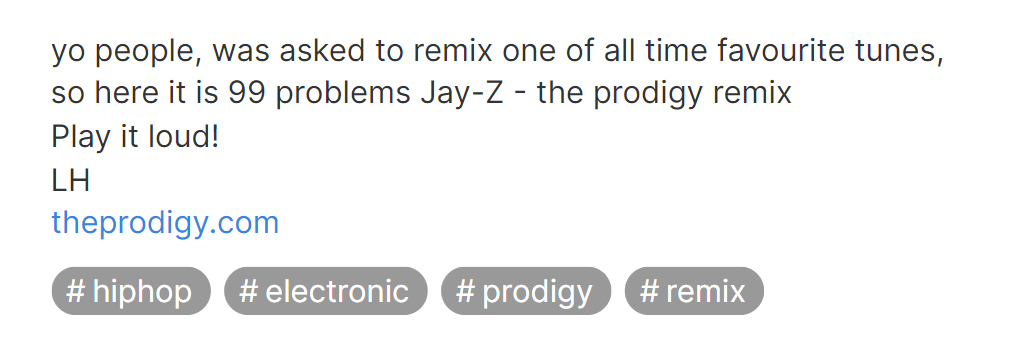
In general, all these facts could be written off as mere coincidence, but there is every reason to believe that it was Howlett’s remix of ’99 Problems’ that actually became ‘Spitfire’ in late 2003/early 2004! But first things first…
In 2010, when the remix was unveiled to the public, neither Jay-Z nor his label had any reason to request the remix from Liam: the artist had no compilations, albums or singles scheduled for release at the time on which Howlett’s tune could appear as a main track or b-side. In addition, the Mercury label, which released promo discs featuring The Prodigy’s remix in 2010, had not worked with Jay-Z for several years: their active collaboration between 1999 and 2003 almost ended with the release of ‘The Black Album’ (on which ’99 Problems’ first appeared) – after which there were only a couple of minor singles.
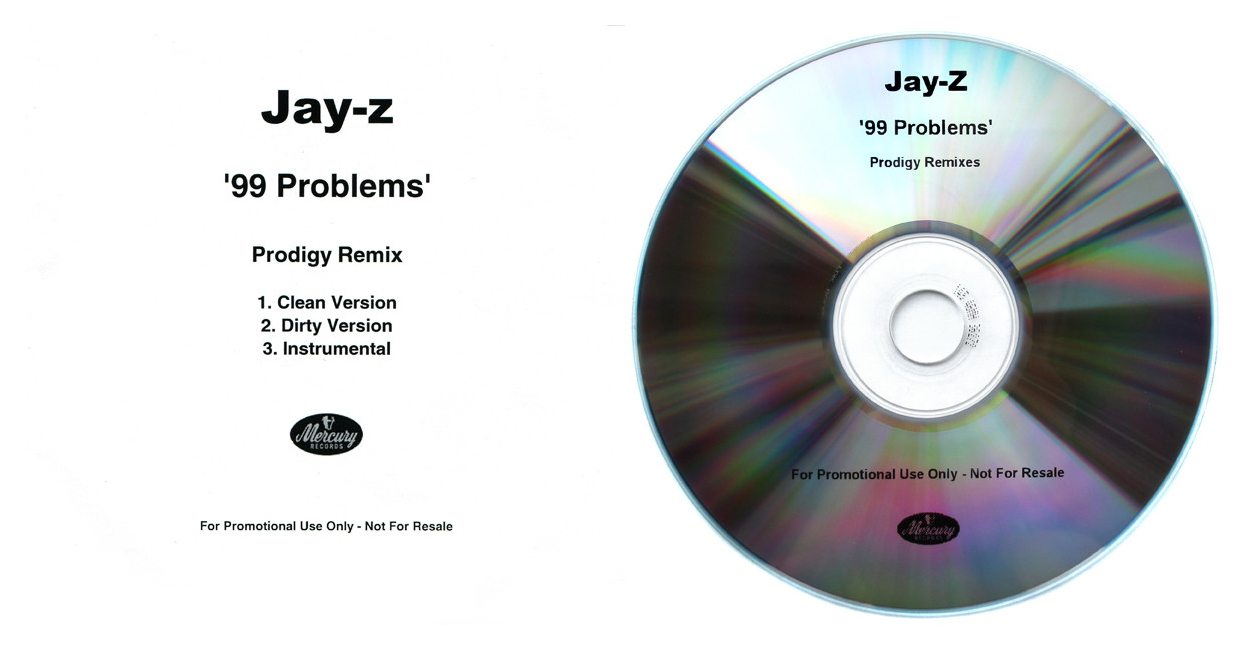
Jay-Z’s ’99 Problems’ was originally recorded in July 2003 and released as a single in the spring of 2004 – it was probably around this time that Howlett received a request to remix the single. Apparently, the remix was either rejected by the label at the time, or Liam himself decided not to use his work in that form to rebuild it into his own tune. As a result, the material was turned into The Prodigy’s ‘Spitfire’, while the remix was shelved.

Photo: instagram.com/theprodigyofficial
In February 2011, The Prodigy had a month-long US tour planned: to mark the occasion, they remembered the very same collaboration with Jay-Z and decided to release it 2 months before the gigs as a promo for the US audience, with a slightly updated sound. Judge for yourself: a legendary UK band collaborating with an iconic US rapper – it’s hard to imagine a better promotion for the upcoming shows. Jay-Z himself, according to Wikipedia, has been extremely positive about the collaboration, saying the remix is one of his favourites.
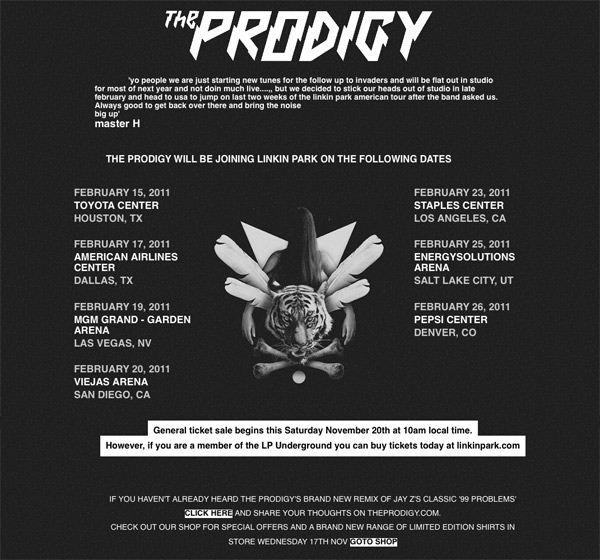
The sound of the remix as a whole is really similar to ‘Spitfire’, starting with at least two common samples and a quite similar drum pattern, and ending with synths that were both included in the studio mix and regularly used as live fillers between 2004 and 2007.
- FILL AFTER ‘SPITFIRE’
Incidentally, one of our team members smashed-up a special video for ’99 Problems (The Prodigy Remix)’ for his video mix years ago – it includes footage from Jay-Z’s original video as well as parts of the ‘Spitfire’ promo.
Anyway, ‘Spitfire’ made it onto the album and became its “opener”, setting the tone for the whole record. But looks like Liam didn’t like the sound of the track too much because he didn’t have enough time to finish it in time for the release. That’s why, at the very beginning of the ‘AONO’ tour he updated the track. A few months later, this version would be finalized and released on a single as Spitfire (05 Version).
In reviews from the new tour, fans immediately noticed Maxim’s fresh vocals: ‘You’ve got to rise, heat up onto the blazing sun! I’ve got to ride, race towards the burning sun! I’ve got to fly, gotta spit it out’. These lines weren’t ultimately recorded in the studio, but they were performed regularly at gigs, they weren’t improvised. This final version of the track with Maxim’s added vocals was played at The Prodigy’s landmark performance at Maida Vale for BBC Radio One on 14 September 2005. Basically, this version can be considered the official full vocal version of the track.
The track didn’t leave the live setlist until 2009, after which it disappeared from the shows for a while. In 2012, ‘Spitfire’ returned in another updated form: this time as a drum ‘n’ bass remix called Spitfast.
Notably, this version evolved from Nightbreed’s remix from the 2005 single. And the 2015 track ‘Roadblox’ from the album ‘The Day Is My Enemy’ was in turn the final iteration of the track that evolved from ‘Spitfast’!
All Souvenirs found all the key elements and recreated ‘Spitfast’ in its studio sound:
Soon we’ll continue the track-by-track story of Always Outnumbered, Never Outgunned, The Prodigy’s most underrated record… Stay tuned!
Headmasters: SIXSHOT, SPLIT
Additional thanks to: Canyon Hill
Donate
- Tether (USDT)
Donate Tether(USDT) to this address


